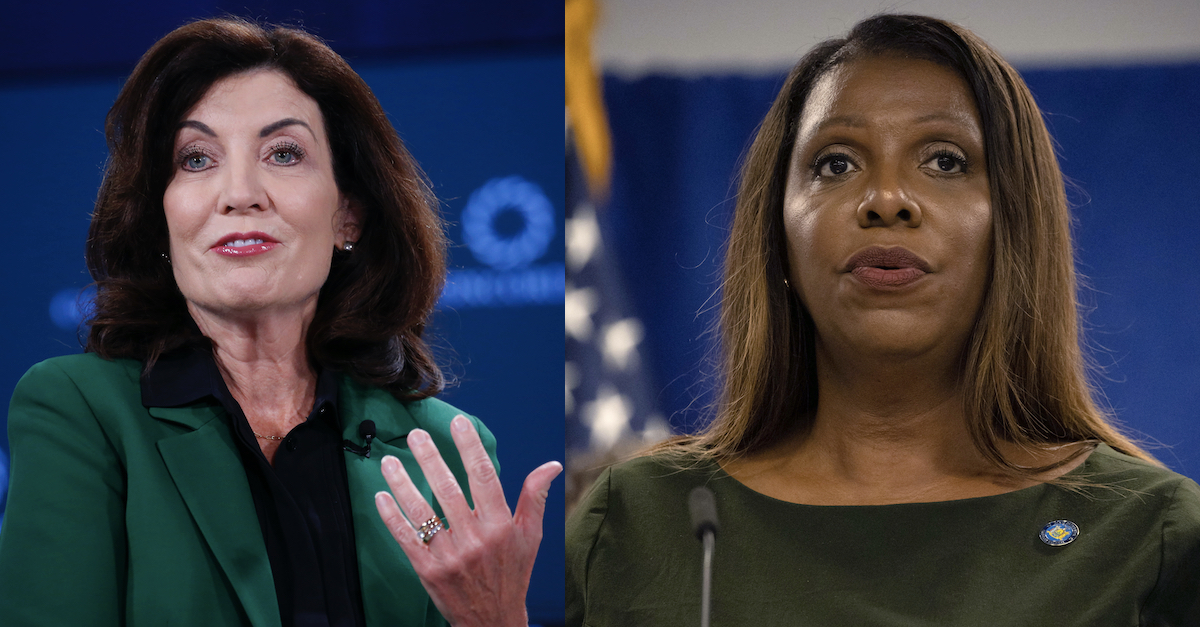
New York Attorney General Letitia James and Gov. Kathy Hochul, both Democrats, on Tuesday joined the longstanding GOP effort to pare back protections afforded to online content platforms under the federal law that forms the basis of the internet as we know it.
The elected officials released a joint report calling for sweeping changes to state and federal law after concluding that several websites frequented by the alleged Buffalo mass shooter, Payton Gendron, played a role in his right-wing and racist radicalization.
After the May 14, 2022 massacre that left 10 Black shoppers dead and three injured at Tops Friendly Market in upstate New York, Hochul’s office issued a referral to James requesting an investigation into “the role of social media platforms in [the] horrific crime.”
During the course of the investigation, James’ office reviewed thousands of pages of documentation subpoenaed from YouTube, 4chan, 8kun/8chan, Reddit, Discord, and Twitch that show how Gendron was able “to plan, prepare, and publicize his attack” on those websites, according to a press release announcing the report.
“The tragic shooting in Buffalo exposed the real dangers of unmoderated online platforms that have become breeding grounds for white supremacy,” James said in the press release. “Today I met with the victims’ families to share the findings of this report. This report is further proof that online radicalization and extremism is a serious threat to our communities, especially communities of color.”
The policy changes called for in the report at the state level include a recommendation “that New York (and other states) impose criminal liability for the creation by the perpetrator of a homicide, or someone acting in concert with the perpetrator, of images or videos depicting the homicide.” The report also argues such content should legally be considered “an extension of the original criminal act” and that it serves to “incite or solicit additional criminal acts.”
At the federal level, James and Hochul have singled out one of former president Donald Trump‘s favorite bugbears: Section 230 of the Communications Decency Act (CDA) of 1996.
“Online platforms enjoy too much legal immunity,” the joint James-Hochul press release says. “Section 230 of the Communications Decency Act largely insulates platforms from liability for their content moderation decisions, even when a platform allows users to post and share unlawful content.”
The report offers the following recommendation:
Reform Section 230: Under Section 230 of the CDA, online platforms are generally spared liability for the content posted by their users, regardless of their moderation practices. We recommend that Congress reform the law to require an online platform to take reasonable steps to prevent unlawful violent criminal content (and solicitation and incitement thereof) from appearing on the platform in order for it to reap the benefits of Section 230.
The since-ill-named federal law has very little to do with indecency – due to Supreme Court First Amendment jurisprudence whittling down the original indecency provisions – but contains ironclad safe harbors for websites that allow other uses to engage in speech online.
Those protections, a persistent piece of legal insulation constantly stuck in Trump’s craw, have been called “Better Than the First Amendment” by internet law scholars because of how insulated such websites actually are. In a legal research article typical of the genre, Texas A&M University School of Law Professor Brian Holland wrote that 230 protections mean “no interactive computer service should be treated as the publisher or speaker of third-party content, and that efforts to moderate content should not create such liability.”
Section 230, scholars and experts on the law have long noted, actually promotes content moderation. The proposed reforms have already resulted in a swift negative reaction online.
Both sides of the political aisle really seem to hate the 1st Amendment. Frustrating. https://t.co/V8EtDKrY86
— Mike Masnick (@mmasnick) October 18, 2022
Our statement:
“The AG’s proposal to change Sec 230 to prevent the spread of violent content misunderstands that Sec 230 already protects and encourages content moderation. The best way to protect content moderation is to protect Sec 230, not to gut it.”https://t.co/GNXB9UYQPl
— Adam Kovacevich (@adamkovac) October 18, 2022
In concert with the recommendation to reform Section 230, James and Hochul are also calling for states to impose “significant” civil liability on anyone who shares “video or images captured by or created by the perpetrator of a homicide depicting the homicide” that “would extend to online platforms that do not take reasonable steps to prevent this content from appearing on their platforms.”
Additionally, at the federal level, James and Hochul want to deputize an extant regulatory agency to explicitly oversee which websites are entitled to Section 230 protections.
“As part of this framework, Congress should authorize a federal agency, such as the United States Federal Trade Commission, or create a new agency dedicated to regulating online platforms, to draft regulations providing guidance on the reasonable steps that an online platform must take to obtain Section 230 protection,” the report says.
“For too long, hate and division have been spreading rampant on online platforms — and as we saw in my hometown of Buffalo, the consequences are devastating,” Hochul said in the press release. “In the wake of the horrific white supremacist shooting this year, I issued a referral asking the Office of the Attorney General to study the role online platforms played in this massacre. This report offers a chilling account of factors that contributed to this incident and, importantly, a road map toward greater accountability.”
[images: Hochul via John Lamparski/Getty Images for Concordia Summit; James via YUKI IWAMURA/AFP via Getty Images]